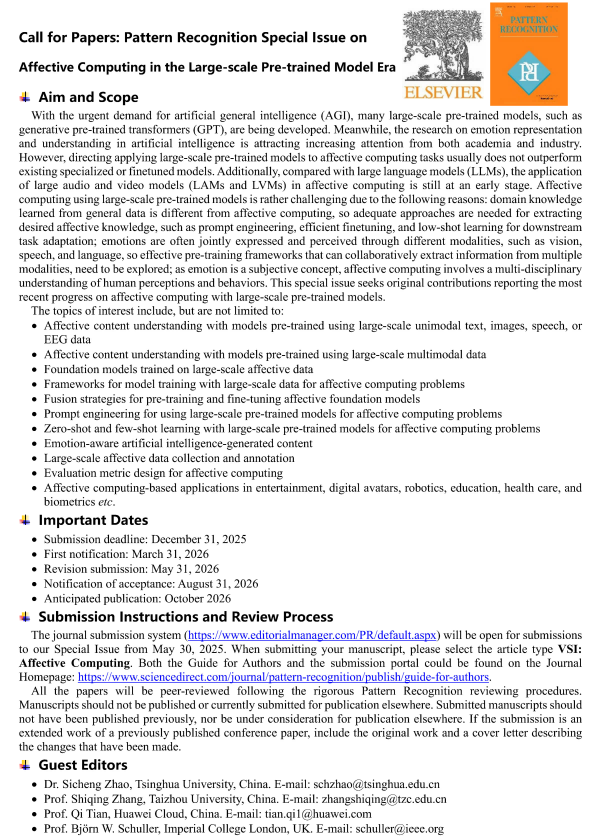Professor Shiqing Zhang, Dean of the School of Electronics and Information Engineering (Big Data Science) of TU, has recently organized a special issue titled “Affective Computing in the Large-scale Pre-trained Model Era” for the prestigious international journal Pattern Recognition (a top-tier SCI Q1 journal in the CAS ranking; classified as A4 by TU; Impact Factor: 7.5). Collaborating with leading scholars globally, Professor Zhang focuses this issue on the intersection of pattern recognition and artificial intelligence. Esteemed guest editors joining him include:
Qi Tian: Chief Scientist, Huawei Consumer BG; International Eurasian Academy of Sciences Academician; ACM & IEEE Fellow.
Björn W. Schuller: Professor, Imperial College London; IEEE Fellow.
Sicheng Zhao: Associate Researcher, Tsinghua University Information Technology National Research Center; National-level Young Talent.

Special issue focus: Affective Computing in the Large-scale Pre-trained Model Era
The concept “mind reading,” once seen as extraordinary, is becoming a reality through Affective Computing. This field empowers machines to observe, comprehend, and express emotions like humans, paving the way for natural and engaging human-machine interaction. Rooted in computer science, psychology, physiology, behavioral science, and neuroscience, its applications range from intuitive interfaces and robotics to mental health analysis.
The push for Artificial General Intelligence (AGI) has spurred the development of large-scale pre-trained models like GPT. While research into AI’s emotional capabilities is booming, simply applying these massive models to affective tasks often falls short of specialized or fine-tuned alternatives. Furthermore, Large Audio Models (LAMs) and Large Video Models (LVMs) lag behind Large Language Models (LLMs) in affective computing maturity.
Key challenges addressed in this special issue include:
Knowledge Gap: General data used in pre-training don’t align perfectly with affective computing needs. Techniques like Prompt Engineering, Efficient Fine-tuning, and Few-shot Learning are crucial to adapt these models.
Multimodal Complexity: Emotions are conveyed through combined signals (visual, speech, text). New pre-training frameworks are needed to effectively fuse information from multiple sources.
Subjectivity: Understanding emotion requires integrating insights across multiple disciplines due to its inherently subjective nature.
This special issue calls for original research showcasing the latest breakthroughs in using large-scale pre-trained models to tackle these challenges in affective computing.
This initiative marks a significant academic achievement for TU’s School of Electronics and Information Engineering (Big Data Science) in the AI field of affective computing, demonstrating strong progress in fostering interdisciplinary research and international collaboration.
Special Issue Link:
https://www.sciencedirect.com/special-issue/322636/affective-computing-in-the-large-scale-pre-trained-model-era
Guest Editors:
Sicheng Zhao (Tsinghua University): National Young Talent; ACM/IEEE/CCF/CSIG Senior Member. Research: Affective Computing, Multimedia Analysis, Multimodal Large Models. Extensive publication record (60+ top-tier papers), 10,000+ citations (H-index 53). He has held leadership roles in key committees (e.g., Secretary-General, CSIG Affective Computing TC) and editorial boards (IEEE TIP, TAFFC), regularly served as Area Chair/Senior PC for major AI conferences (NeurIPS, CVPR, etc.), and led national-level research projects. He has been awarded numerous prestigious prizes (Beijing Natural Science Prize, CSIG awards, etc.), and recognized on the AI 2000 Most Influential Scholars list and the Stanford Top 2% Scientists list.
Shiqing Zhang (Taizhou University): Professor, Ph.D. Supervisor; Zhejiang High-level Talent; Chair, Municipal AI Society; CCF Senior Member; Executive Committee Member for key CCF/CSIG technical committees (Multimedia, Speech, Affective Computing). Research area: Machine Learning, Pattern Recognition, Affective Computing. He has secured multiple national and provincial research grants, published 70+ papers in leading venues (IEEE TMM, TCSVT, TAFFC, ACM MM), including 2 ESI Highly Cited Papers, and received provincial and national society science & technology awards (Zhejiang Natural Science Prize, CSIG/CIS Progress Prizes). He has been consistently ranked among the Stanford Top 2% Scientists (Career & Annual Impact). Currently he serves as Associate Editor for IEEE Transactions on Affective Computing (SCI Q1, IF 9.6) and Area Editor for Information Fusion (SCI Q1, IF 14.7).
Qi Tian (Huawei): Chief Scientist, Huawei Consumer BG; International Eurasian Academy of Sciences Academician; ACM & IEEE Fellow. He is the Former Associate Editor for several top journals (IEEE TMM, TCSVT, TNNLS, ACM TOMM), a holder of multiple US patents, and a prolific author (~760 papers) in premier computer vision/multimedia venues (TPAMI, CVPR, ICCV, etc.) with over 75,400 citations (H-index 119). He has gained 9 Best Paper awards (including ACM Multimedia), and is the sole corresponding author of the Nature paper on the Pangu-Weather model, named one of the Top 10 Breakthroughs of 20023 by Science and ranked 1st in China's Top 10 Science Advances.
Björn W. Schuller (Fellow, IEEE): head of Imperial College London’s Group on Language Audio & Music (GLAM), CEO of the Audio Intelligence company aud EERING, and a Full Professor at TUM in Munich/Germany in Health Informatics. EE/IT. His 1200+ technical publications including 250+ journal articles (60k citations, h-index 100+) focus on machine intelligence for affective multimedia analysis. He is a Fellow of the IEEE, President-Emeritus and Fellow of the AAAC, Fellow of the BCS, Fellow of ELLIS, Field Chief Editor of the Frontiers in Digital Health and former Editor in Chief of the IEEE Transactions on Affective Computing, Associate Editor of the IEEE Transactions on Neural Networks and Learning Systems, the IEEE Transactions on Cybernetics, and so on. He received a range of awards including being honored as one of 40 extraordinary scientists under the age of 40 by the World Economic Forum in 2015. In 2017, his company secured the 1st place as Innovator of The Year of the Digital Marketing Innovation World Cup. His research has garnered over 20 million USD in extramural funding. Advisory board activities comprise his role as consultant of global enterprises such as HUAWEI and SAMSUNG.